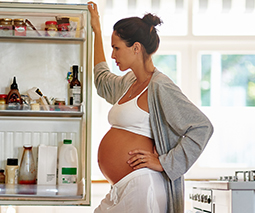10 things that will keep you up at night while pregnant

You’re pregnant! Time to shop for cute baby supplies, enjoy a glowing complexion and prepare the nursery. But for many expectant mums, it is also time to bid goodbye to sleep.
As your body gets to work creating new life, maintaining a satisfying sleep pattern can prove difficult.
We’ve compiled a list of ten of the most common obstacles to sleep during pregnancy, with a few tips to help you overcome each.
 1. Nausea
1. Nausea
Morning sickness can be most prominent in the first trimester but for some mums-to-be nausea plagues them throughout their pregnancy. And while nausea can get in the way of good slumber, a lack of sleep can also be a trigger for nausea – ahh, isn’t pregnancy such a fun rollercoaster to ride?!
But before you put up the white flag and accept exhaustion as a way of life, there are some simple things you can do that may help. Try these nine tips to help expectant mums battle morning sickness from dietician Melanie McGrice.
One of those tips is to eat smaller portions more regularly throughout the day to ensure there is always something in your stomach to keep nausea at bay. Keeping salty snacks such as light crackers or nuts beside the bed can also offer quick relief when nausea strikes at bedtime.
2. Sore breasts
Hormones are amazing things, preparing our body for feeding baby, but the rises in oestrogen and HCG levels during pregnancy also leave our breasts feeling very tender. The ultra sensitivity can make it difficult to wear a shirt let alone have a blanket or even a sheet on and, for those of us who love sleeping on our stomachs, this can become near impossible.
A warm shower before bed and a few extra pillows to help ease you into your new sleep position could make all the difference. Check out these great pregnancy pillows specifically designed to help pregnant women sleep comfortably.
3. Increased need to pee
A big thank you again goes out to the hormones for your constant night time trips to the toilet – that and the growing baby putting more and more pressure on your bladder.
Staying hydrated during pregnancy is important for you and the baby but BabyCenter suggests drinking more fluids early in the day and less in the evening to help cut down trips to the bathroom at night.
Personally, I remember during my first pregnancy being told by my obstetrician to also make each trip to the bathroom count by sitting just a little longer to empty my bladder as much as possible.
4. Leg cramps
Be it your newly slowed blood circulation, the extra weight you are carrying or extra pressure placed on your nerves, when leg cramps strike in pregnancy it can be extremely painful.
As well as ensuring you are well hydrated and getting all the nutrients you need in your diet so baby doesn’t leave you depleted, taking a short walk or stretching before bed can help with circulation.
5. Heartburn
Your growing uterus needs more room so it is not just your bladder that feels the pressure, but your stomach too.
To minimise the reflux or at least lessen its severity, avoid trigger foods such as those packed with spice or those that are acidic, and don’t eat a big meal too close to bedtime. Again, as dietician Melanie McGrice suggests, opt for small and regular meals throughout the day.
Keeping your head elevated with an extra pillow when you do hop into bed can also help alleviate heartburn.
6. Sinus congestion
If you have ruled out allergies and illness, the sinus congestion you are experiencing could simply be another delightful part of your pregnancy. Increasing oestrogen levels can cause your mucus membranes to swell, resulting in a lot of extra mucus production. Unfortunately, increased blood volume during pregnancy can also inflame tiny blood vessels in the nose.
It is important not to take any medications to alleviate sinus congestion during pregnancy without first speaking to your doctor to ensure it is safe for you and the baby.
Medications aside, using a humidifier or inhaling steam can help ease your symptoms, and elevating your head at bedtime can help open your airways for a good night’s sleep.
7. Uncomfortable
When your go-to sleep position before pregnancy isn’t an option (sorry, tummy sleepers!) and every part of you is swollen or sore, it can be hard to get the rest you desperately need.
Getting yourself a comfortable pregnancy sleep pillow can really help to support your growing bump and aching back. There are also some great and safe options for prenatal massages that can help.
Touch Research Institute director Dr Tiffany Field told Massage Envy that massages can provide expectant mums with a better night’s sleep by releasing natural chemicals in the body to aid relaxation and sleep, and even ease anxiety
“Massage is very effective at increasing deep sleep,” Dr Tiffany Field says.
8. Napping
We may have avoided it as children, but taking a nap as an adult can be pure luxury.
Growing a human can be tiring work so expectant mums should take the opportunity to nap, however, Baby Center warns against “napping too late in the day as it can interfere with your sleep at night”.
Of course if you are really struggling to fall asleep at all then, I say, take every opportunity you can to get as much shut-eye as possible.
9. Nightmares
So you finally fall asleep only to wake in a state of panic after an intense and vivid dream, often related to your unborn baby.
Sleep science expert Dr Neil Stanley told Mother and Baby everyone has four to five dreams a night but we only remember those that we wake up during. He says the physical discomforts and hormonal changes causing expectant mums to wake more often means they have a greater chance of remembering them.
“No one really knows why we dream, but one theory is that dreams prepare us for the worst-case scenario,” Dr Stanley says. “It’s probably just the brain dealing with the situation, to be at the ready should the very worst happen. You’re likely to be in a more emotional state while pregnant, so it’s common to attach more meaning than usual to your dreams – especially those about your baby.”
10. Unnecessary worry
Isn’t it funny how you can spend all day tired and counting down to the moment you are reunited with your bed, but when the time comes all the worries in your world come flooding in?
When all around you is silent and dark, it can be hard to switch off your brain off and relax into sleep. As you approach baby’s due date, often concerns you have about the unknown can make it even harder.
Baby Center suggests keeping a notepad and pen by the bed to write any concerns down or compiling a physical list of worries at least an hour before bed. The theory is to get them off your mind and onto paper, a kind of to-do list for later. The reality is you may need to buy milk, but worrying about it all night isn’t going to help.
While that example may seem trivial, the same can be said for any bigger problems too. So write them down and perhaps you can get some rest!
Meanwhile, why didn’t anyone tell us that the sleep deprivation of parenthood really begins before bub even arrives? Here’s hoping some of these tips will help you get a better night’s sleep, mamas-to-be.










